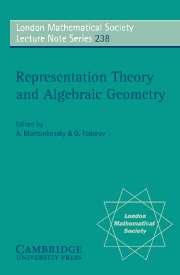Book contents
- Frontmatter
- Contents
- Preface
- Some Problems On Three-Dimensional Graded Domains
- The mathematical influence of Maurice Auslander in Mexico.
- Intertwined With Maurice
- Introduction to Koszul algebras
- Old and recent work with Maurice
- The Development of the Representation Theory of Finite Dimensional Algebras 1968 – 1975
- Algebraic Geometry Over Q
Introduction to Koszul algebras
Published online by Cambridge University Press: 06 December 2010
- Frontmatter
- Contents
- Preface
- Some Problems On Three-Dimensional Graded Domains
- The mathematical influence of Maurice Auslander in Mexico.
- Intertwined With Maurice
- Introduction to Koszul algebras
- Old and recent work with Maurice
- The Development of the Representation Theory of Finite Dimensional Algebras 1968 – 1975
- Algebraic Geometry Over Q
Summary
This paper is dedicated to the memory of Maurice Auslander, whose love of mathematics will always be an inspiration
Abstract
In this paper we survey, without proof, the main structural results of Koszul algebras. We also survey the extension of this theory to semiperfect Noetherian rings. Applications to algebras of global dimensions 1 and 2 are discussed as well as applications to Auslander algebras and to preprojective algebras.
Introduction and Definitions
Koszul algebras have played an importart role in commutative algebra and algebraic topology [22, 16, 17, 3, 4, 24, 25]. Recently there have been important applications of noncommutative Koszul algebras to algebraic topology, Lie theory and quantum groups [8, 7, 23, 5]. This paper begins with some terminology and definitions in this section. In section 2, we survey the main results about Koszul algebras. Definition of a Koszul algebra follows in this section. The proofs of the results in this section can be found in [14, 15]. In section 3, we survey the main results about Koszul modules stressing the duality between the category of Koszul modules of a Koszul algebra and the category of Koszul modules over the Yoneda algebra. Again, proofs may be found in [14, 15]. The cited references, the concept of a Koszul algebra and module is extended outside the graded case. The notion of quasi-Koszul algebra is introduced.
- Type
- Chapter
- Information
- Representation Theory and Algebraic Geometry , pp. 45 - 62Publisher: Cambridge University PressPrint publication year: 1997
- 3
- Cited by

